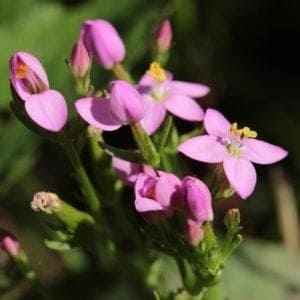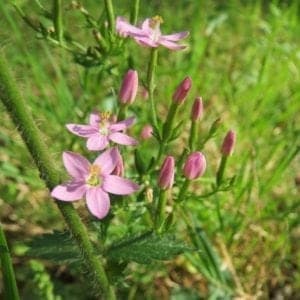Centaury: Herb of the Week
Centaury (Centaurium erythraea) was Ryn’s very first “herb of the month” when he began studying herbal medicine, and now it’s our herb of the week!
Chiron’s Gift
Originally, Ryn was drawn to this herb because it has centaurs in the name – and that’s as good a reason as any! Why centaurs? It’s rooted in mythology about Chiron, the centaur, who was a great healer and teacher of medicine. If they’ve named an herb after him, it must be a pretty mighty herb!
This lovely little flower is indeed mighty – it’s mighty bitter! But don’t let that stop you: Ryn drank a whole quart of centaury tea every day for a month and his digestion loved it – in fact, he still turns to centaury when his stomach feels off.
A Classic Bitter
Centaury is one of the classic bitters – it’s very straightforward in its bitterness. Its taste is clear, cold, and cutting.
Bitters like this will stimulate digestive secretions throughout the GI tract, helping you assimilate the nutrients from your food. They are also strongly drying and draining to stagnant fluids; centaury is helpful for mitigating fluid retention and edema. In addition, centaury is a stomachic herb – it strengthens the stomach in those who have weak digestion.
It can be helpful to take centaury before eating, especially if it’s a meal that would normally be challenging to digest and give you an upset stomach – not that it’s an excuse to eat fried mozarella sticks for dinner! Just a few drops of tincture on the tongue will do.
A Sustainable Choice
Centaury is a relative of the gentians (Gentiana spp.), which are somewhat more famous as medicinal herbs. Many of the gentians, though, have been overharvested in the wild, and the entire genus is on the United Plant Savers “To Watch” list.
Centaury is more abundant in the wild, so its status is more secure. Furthermore, with gentian it is the root which is prized, whereas of centaury we work with the aerial parts (leaves, stems, flowers). So, when centaury is harvested, the plant is not killed as when harvesting gentian, and the plant population has an easier time recovering and sustaining itself. For these reasons, we work with centaury much more frequently than gentian.
Essential Cocktail Bitters Ingredient
If you love making cocktail bitters, you’ll love centaury! As mentioned, gentian is an at-risk plant – but it’s also a key component in so many popular cocktail bitters, like Angostura and Peychaud’s. (In fact, they even used it in Moxie soda, though I can’t imagine putting bitter gentian in a sweet soda!)
Enter centaury! It’s in the same family, and the flavor profile is SUPER similar – most people probably can’t tell the difference.
Making your own cocktail bitters starts with a simple tincture. Try a combo of 1 teaspoon each of centaury, allspice, and cardamom, plus the zest of 3 oranges, tinctured in 2 cups of vodka for two weeks. Then strain, but reserve the marc, and decoct it for 10 minutes in 1 cup of water. Mix that “tea” with the tincture, and add 2 tbsp honey. There you go – you’ve made a simple citrus cocktail bitters. Try a dropperful in your next Manhattan or Old Fashioned!
Want to learn more about herbs that can make your life better? Check out our Materia Medica program – it’s a complete herbal toolkit to keep you healthy and strong!

Join our newsletter for more herby goodness!
Get our newsletter delivered right to your inbox. You'll be first to hear about free mini-courses, podcast episodes, and other goodies about holistic herbalism.




